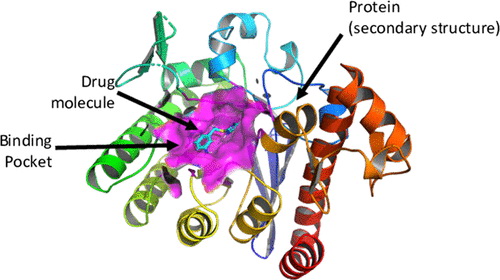EnzymoGenius™ specializes in optimizing ligand binding affinity through cutting-edge protein-ligand modeling. Employing advanced computational methodologies, we elevate the precision of ligand-protein interactions to enhance binding affinity, offering unparalleled solutions in the realm of molecular design.
Overview
Enhancing ligand binding affinity through protein-ligand modeling is a pivotal aspect of contemporary molecular biology research. Employing advanced computational techniques, researchers analyze the dynamic interactions between proteins and ligands at the atomic level, deciphering the intricate structural nuances that govern binding affinity. Integration of quantum mechanics and molecular mechanics simulations refines the understanding of the binding energetics, enabling the identification of key residues and structural motifs crucial for ligand recognition. Recent strides in molecular dynamics simulations and artificial intelligence-driven approaches have expedited this process, facilitating the exploration of vast conformational spaces. These endeavors illuminate potential avenues for rational drug design, elucidating how subtle modifications in ligand structure or protein conformation can optimize binding interactions and consequently enhance ligand binding affinity, offering promising prospects for the development of targeted therapeutics.
 Fig. 1 Example of a ligand–receptor. (Jones D, et al., 2021)
Fig. 1 Example of a ligand–receptor. (Jones D, et al., 2021)
Our Services
- Molecular Docking Simulations
Employing sophisticated algorithms, our service conducts intricate molecular docking simulations to predict the optimal binding conformations between ligands and proteins.
- Quantitative Structure-Activity Relationship (QSAR) Analysis
Our in-depth QSAR analysis dissects the quantitative correlation between molecular structures and binding affinities, providing invaluable insights for ligand optimization.
- Free Energy Calculations
Utilizing state-of-the-art free energy calculation methods, we precisely estimate binding affinities, enabling a comprehensive understanding of ligand-protein interactions.
- Virtual Screening
Our virtual screening process efficiently identifies potential drug candidates by screening vast molecular databases, streamlining the drug discovery pipeline.
Application Areas We Can Serve
- Drug Discovery
Our services play a pivotal role in accelerating drug discovery by optimizing the binding affinity of potential drug candidates.
- Biological Research
EnzymoGenius™ aids in elucidating complex biological pathways by fine-tuning ligand interactions within intricate protein networks.
- Enzyme Engineering
We contribute to the field of enzyme engineering by optimizing ligand binding, enhancing the catalytic efficiency of enzymes for various industrial applications.
Our Technical Advantages
- High-Performance Computing
Leveraging the power of high-performance computing clusters, we ensure swift and accurate simulations for large-scale protein-ligand systems.
- Machine Learning Integration
Our service integrates machine learning algorithms to refine predictive models, enhancing the accuracy of ligand binding affinity predictions.
- Customized Solutions
EnzymoGenius™ tailors its methodologies to specific client needs, providing bespoke solutions for diverse ligand optimization challenges.
EnzymoGenius™ stands at the forefront of molecular design, providing a suite of services meticulously designed to optimize ligand binding affinity. Our computational prowess, underpinned by high-performance computing and machine learning integration, ensures unparalleled accuracy in predicting and enhancing ligand-protein interactions. From drug discovery to enzyme engineering, our tailored solutions cater to a spectrum of applications in the biological sciences. For inquiries and consultations, please do not hesitate to contact us.
Reference
- Jones, D.; et al. Improved protein–ligand binding affinity prediction with structure-based deep fusion inference. Journal of Chemical Information and Modeling. 2021, 61(4): 1583–1592.

































 Fig. 1 Example of a ligand–receptor. (Jones D, et al., 2021)
Fig. 1 Example of a ligand–receptor. (Jones D, et al., 2021)